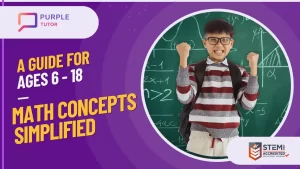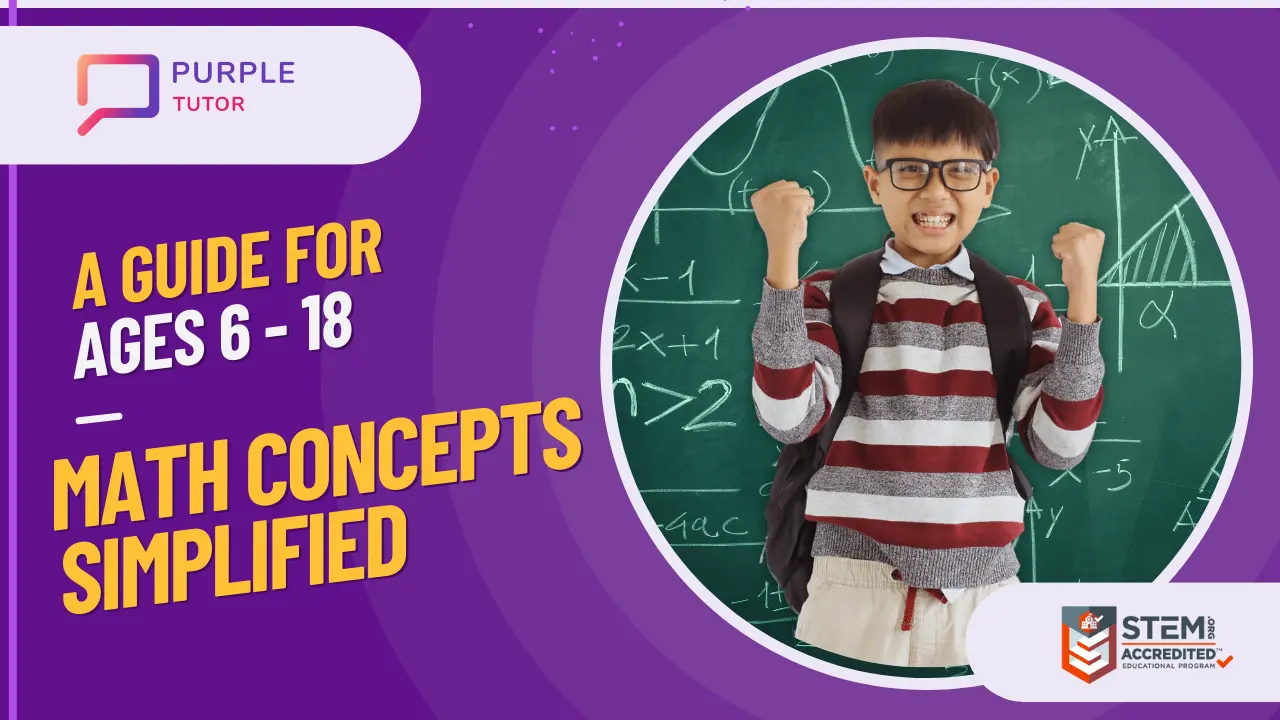 Math concepts can often appear as a formidable subject, but there’s no need for them to be intimidating. With the right guidance and approach, math concepts can evolve into a captivating journey for children aged 6 to 18 and their parents. In this article, we’ll delve into a roadmap aimed at simplifying mathematical concepts, including fundamental concepts in geometry, employing highly engaging methods. Whether you’re a young learner or a parent seeking to bolster your child’s mathematical journey, read on to uncover strategies on making math accessible and enjoyable for all age groups.
Math concepts can often appear as a formidable subject, but there’s no need for them to be intimidating. With the right guidance and approach, math concepts can evolve into a captivating journey for children aged 6 to 18 and their parents. In this article, we’ll delve into a roadmap aimed at simplifying mathematical concepts, including fundamental concepts in geometry, employing highly engaging methods. Whether you’re a young learner or a parent seeking to bolster your child’s mathematical journey, read on to uncover strategies on making math accessible and enjoyable for all age groups.
Fundamental Math concepts
In the realm of mathematics, fundamental math concepts are the cornerstone of numerical literacy. From basic arithmetic to foundational algebra, these principles are essential for solving everyday problems and excelling academically. Join us on a journey to explore, understand, and harness the power of fundamental math, equipping you with the tools for mathematical mastery and real-world application. Whether you’re a student or a parent seeking to support mathematical growth, this subheading will serve as your guide to building a strong mathematical foundation.
Important Math Topics
Before we dive into the specifics, let’s briefly touch upon some of the most important math topics that students aged 6 to 18 encounter during their academic journey. These topics serve as the foundation for advanced learning and problem-solving skills.
- Arithmetic Basics: For the youngest learners (ages 6 to 8), arithmetic basics such as addition, subtraction, multiplication, and division lay the groundwork for more complex mathematical concepts.
- Geometry Fundamentals: Moving on to ages 9 to 12, basic concepts in geometry come into play. Children start exploring shapes, angles, and spatial relationships, developing critical thinking skills.
- Algebraic Principles: As students approach their teenage years (ages 13 to 18), algebraic principles become increasingly important. Equations, variables, and solving for unknowns become routine.
- Statistics and Probability: These topics, typically introduced in the later years, empower students to analyze data, make predictions, and interpret information.
- Calculus: For those who wish to explore mathematics at an advanced level, calculus opens up new horizons, enabling a deep understanding of change and motion.
Unlocking Maths Basic Concepts (Ages 6-9)
Our journey begins with the essential maths basic concepts. These are the building blocks of mathematics, including addition, subtraction, multiplication, and division. For children aged 6 to 9, mastering these foundational skills is crucial. In this section, we will explore interactive methods and practical activities that both students and parents can use to reinforce these fundamental skills.
Exploring Mathematical Concepts (Ages 10-12)
As students’ progress, they explore a wider range of math concepts. This age group, spanning from 10 to 12, provides an optimal opportunity to introduce fundamental mathematical concepts such as fractions, decimals, percentages, and more. We will delve into these math concepts using real-world illustrations and hands-on exercises, fostering a profound and lasting comprehension.
Unlocking Basic Concepts in Geometry (Ages 13-15)
Ages 13 to 15 mark a significant milestone in the exploration of math concepts, particularly within the domain of geometry. This is the stage where math concepts truly come into focus, as students delve into the fundamental principles of geometry, which encompass a wide array of topics, including geometric shapes, angles, and essential theorems.
Mastering Geometry Concepts (Ages 16-18)
By ages 16 to 18, students are prepared to delve into more complex math concepts encompassing trigonometry, coordinate geometry, and geometric proofs. These advanced mathematical topics are not only crucial for academic achievement but also lay a strong foundation for future careers in STEM fields, where a solid grasp of math concepts is indispensable for success.
Making Math Concepts Engaging for All
Math concepts don’t need to feel overwhelming; instead, they can be an exciting voyage for both students and parents. By integrating interactive games, real-world scenarios, and educational math apps into the learning experience, you can metamorphose mathematics from a daunting challenge into a genuine passion.
To learn more Maths concepts online, click here.
Simplifying Math Concepts
Now, let’s explore how to simplify mathematical concepts for children aged 6 to 18.
- Engaging Visuals: Incorporate visually stimulating materials like colorful charts, diagrams, and interactive apps to make math concepts more relatable.
- Real-World Applications: Show how math is used in everyday life, from calculating grocery bills to measuring ingredients for a recipe.
- Hands-On Activities: Engage in hands-on activities that promote learning through play. For basic concepts in geometry, consider building shapes with everyday objects.
- Gamification: Turn math into a game with math-related board games, puzzles, and online challenges. This makes learning enjoyable and competitive.
The Role of PurpleTutor Live Classes
To make this math journey even more enriching, consider PurpleTutor live classes. PurpleTutor offers live online classes that cater to children aged 6 to 18 and their parents, providing an interactive and personalized learning experience.
- Interactive Learning: PurpleTutor’s live classes provide an interactive platform where students actively participate, ask questions, and engage with experienced educators, enhancing comprehension of maths concepts.
- Structured Curriculum: Our live classes follow a meticulously designed curriculum, ensuring students cover maths concepts, including maths basic concepts, basic concepts in geometry, numbers, place value, arithmetic, calculus, trigonometry etc in a systematic manner.
- Peer Collaboration: Students have the opportunity to collaborate with their peers in PurpleTutor’s live classes, fostering a sense of community, healthy competition, and overall improved learning.
- Parental Involvement: Parents can actively monitor their child’s progress, receive regular updates, and provide additional support when needed, creating a collaborative learning environment.
Conclusion
Mathematics is a universal language and a critical skill for success. By simplifying maths concepts, including exploring maths basic concepts, arithmetic, geometry, calculus, number, place value, fractions etc students aged 6 to 18, along with their parents, can embark on a mathematical journey filled with excitement and achievement.
Invest in your child’s mathematical journey today and experience the transformative power of PurpleTutor live classes in making maths concepts simpler and more accessible for all. Together, we can pave the way for mathematical excellence for the younger generation.
Frequently Asked Questions (FAQs)
1. Does PurpleTutor offer a free demo class for math?
A: Absolutely! PurpleTutor provides a complimentary demo class for math concepts. Booking your demo class is easy; simply use the provided booking link. We encourage you to take advantage of this opportunity to experience our unique teaching approach.
2. Can I customize my class schedule for math?
A: Yes, flexibility is our priority. You have the freedom to select both the day and time that best suits your schedule when studying math concepts. We recognize that each student’s availability varies, so we cater to your specific needs.
3. What are the fees and pricing for math?
A: Our approach is as personalized as our classes. We recommend starting with a trial class, during which you can discuss your specific math concept requirements with our teachers and counselors. Once we understand your needs, we will provide you with a tailored pricing structure.
4. Does PurpleTutor align with the school curriculum for math?
A: Absolutely! We align our math concept teaching with your school’s curriculum. We cover the entire grade curriculum within an average of 100 to 200 hours, spread over an academic year. The duration may vary depending on individual math requirements.
5. What are the prerequisites for learning Math with PurpleTutor?
A: All you need is a laptop or computer with a webcam and a stable internet connection. With these basic requirements, you’re ready to embark on your math concept learning journey with us.
6. Are there assessments during the math course?
A: Yes, we believe in regular assessments to effectively track your progress in math. We provide feedback on your performance, ensuring you stay on the right path to math concept success.
7. Do you provide worksheets and practice problems for math?
A: We’ve got you covered! For each grade level, we offer a variety of worksheets and practice problems to enhance your understanding of math concepts. Our teaching methodology focuses on building a solid conceptual foundation while applying real-world context to the problems.
8. Does PurpleTutor offer after-school and homework support for math?
A: Yes, we understand that learning extends beyond the classroom. Depending on your needs, our instructors are here to offer after-school support and assist with your math concept homework.
9. Will PurpleTutor prepare my child for math exams?
A: Certainly! If your child requires additional exam preparation for math concepts, we offer extra sessions to ensure they are well-prepared and confident for their math concept exams.
10. What kind of certificate will my child receive upon completion of the math course?
A: Upon successfully completing the course for the registered grade level, your child will receive a course completion certificate from PurpleTutor. Our courses and certificates are accredited by STEM.org, a leading STEM education research and credentialing organization in the USA.
11. What courses does PurpleTutor offer in addition to math?
A: PurpleTutor offers a wide range of cutting-edge courses to prepare students for the future. In addition to math courses spanning from elementary school to high school, we also offer coding courses, including Python, Web Development, Machine Learning, Artificial Intelligence, Cyber Security, Roblox Games, and more. For detailed information on our courses, please visit our courses section or consult with a counselor. We encourage you to book a complimentary class with us to experience our teaching firsthand and discuss course options with our teachers.

